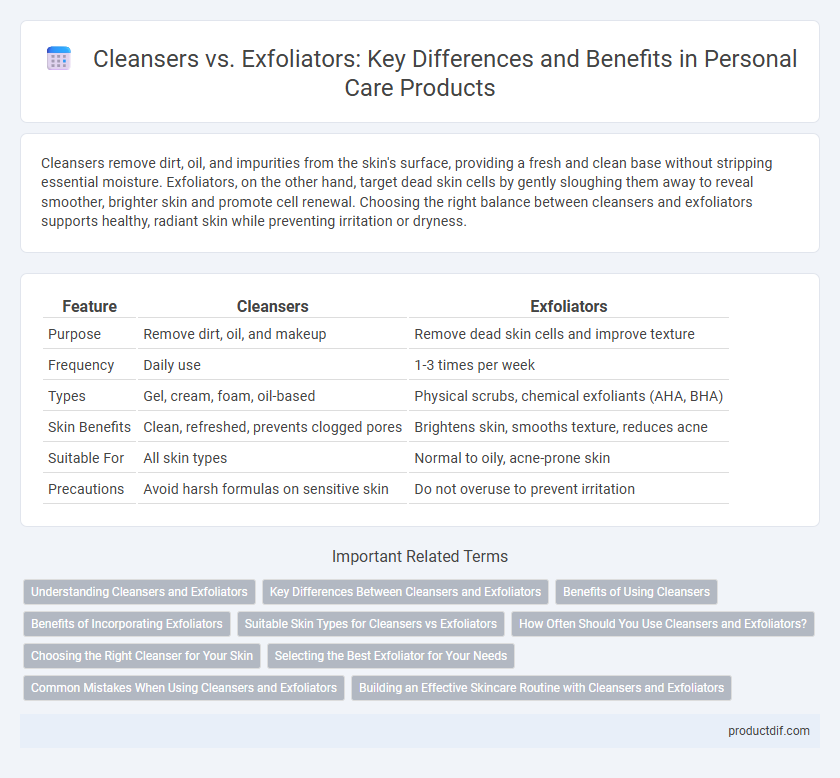Cleansers remove dirt, oil, and impurities from the skin's surface, providing a fresh and clean base without stripping essential moisture. Exfoliators, on the other hand, target dead skin cells by gently sloughing them away to reveal smoother, brighter skin and promote cell renewal. Choosing the right balance between cleansers and exfoliators supports healthy, radiant skin while preventing irritation or dryness.
Table of Comparison
| Feature | Cleansers | Exfoliators |
|---|---|---|
| Purpose | Remove dirt, oil, and makeup | Remove dead skin cells and improve texture |
| Frequency | Daily use | 1-3 times per week |
| Types | Gel, cream, foam, oil-based | Physical scrubs, chemical exfoliants (AHA, BHA) |
| Skin Benefits | Clean, refreshed, prevents clogged pores | Brightens skin, smooths texture, reduces acne |
| Suitable For | All skin types | Normal to oily, acne-prone skin |
| Precautions | Avoid harsh formulas on sensitive skin | Do not overuse to prevent irritation |
Understanding Cleansers and Exfoliators
Cleansers remove dirt, oil, and impurities from the skin's surface, maintaining a clean and fresh complexion. Exfoliators eliminate dead skin cells and promote cell turnover, revealing smoother and brighter skin underneath. Choosing the right product depends on skin type and concerns, as cleansers are gentler and used daily, while exfoliators are typically used less frequently for targeted renewal.
Key Differences Between Cleansers and Exfoliators
Cleansers primarily remove dirt, oil, and makeup from the skin's surface without altering its texture, while exfoliators target dead skin cells to reveal smoother, brighter skin underneath. Cleansers are typically used daily to maintain skin hygiene, whereas exfoliators are recommended 1-3 times per week to prevent irritation and over-exfoliation. Formulations differ significantly; cleansers are often gentle and hydrating, whereas exfoliators contain active ingredients like alpha hydroxy acids (AHAs), beta hydroxy acids (BHAs), or physical scrubs to enhance cellular turnover.
Benefits of Using Cleansers
Cleansers effectively remove dirt, oil, and makeup from the skin's surface, promoting a clear and refreshed complexion. They help maintain the skin's natural moisture barrier, preventing dryness and irritation common with harsh exfoliators. Using gentle cleansers daily supports overall skin health and prepares the skin for better absorption of subsequent skincare products.
Benefits of Incorporating Exfoliators
Exfoliators enhance skin texture by removing dead cells and promoting cellular turnover, resulting in a brighter and smoother complexion. They help prevent clogged pores and reduce the appearance of fine lines and acne, supporting overall skin health. Regular exfoliation boosts the effectiveness of moisturizers and serums by improving product absorption.
Suitable Skin Types for Cleansers vs Exfoliators
Cleansers are suitable for all skin types, including sensitive, oily, dry, and combination, as they gently remove dirt, oil, and makeup without disrupting the skin's natural barrier. Exfoliators are best for normal, oily, and combination skin types, targeting dead skin cells to promote smoother texture but may cause irritation for sensitive or dry skin when overused. Choosing the right product depends on individual skin concerns and tolerance to active ingredients like alpha hydroxy acids (AHAs) or beta hydroxy acids (BHAs).
How Often Should You Use Cleansers and Exfoliators?
Cleansers should be used twice daily to remove dirt, oil, and makeup without stripping the skin's natural moisture barrier. Exfoliators, depending on the skin type and product strength, are recommended 1-3 times per week to slough off dead skin cells and promote cell renewal without causing irritation. Over-exfoliation can lead to redness and sensitivity, so it's essential to choose gentle formulas and adjust frequency based on skin response.
Choosing the Right Cleanser for Your Skin
Selecting the right cleanser depends on your skin type and concerns, as cleansers effectively remove dirt, oil, and makeup without stripping natural moisture. For sensitive or dry skin, hydrating cleansers with gentle ingredients like glycerin or ceramides help maintain the skin barrier. Oily or acne-prone skin benefits from foaming or gel cleansers containing salicylic acid to control excess sebum and prevent breakouts.
Selecting the Best Exfoliator for Your Needs
Choosing the best exfoliator involves understanding your skin type and concerns, such as sensitivity, dryness, or acne-prone skin, to avoid irritation and maximize results. Chemical exfoliators with alpha hydroxy acids (AHAs) or beta hydroxy acids (BHAs) are ideal for gentle yet effective removal of dead skin cells, while physical exfoliators with fine particles work better for normal to oily skin types seeking immediate smoothness. Prioritize exfoliators that balance efficacy with hydration and barrier protection to maintain healthy, radiant skin without over-exfoliation.
Common Mistakes When Using Cleansers and Exfoliators
Using cleansers too frequently or choosing formulas that strip the skin's natural oils can lead to dryness and irritation. Over-exfoliating by applying scrubs or chemical exfoliants more than two to three times per week causes microtears and disrupts the skin barrier. Failure to rinse thoroughly or mixing exfoliators with harsh cleansers increases the risk of sensitivity and redness.
Building an Effective Skincare Routine with Cleansers and Exfoliators
Cleansers remove dirt, oil, and impurities to maintain clear pores and fresh skin, forming the foundational step in any skincare routine. Exfoliators eliminate dead skin cells, promoting cell turnover and enhancing skin texture for a radiant complexion. Combining gentle daily cleansing with regular exfoliation tailored to skin type maximizes hydration, prevents breakouts, and supports overall skin health.
Cleansers vs Exfoliators Infographic

 productdif.com
productdif.com